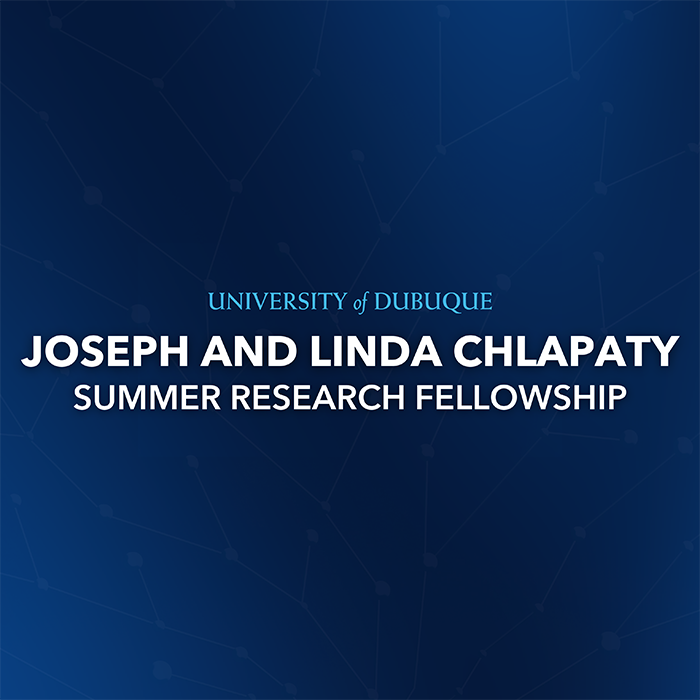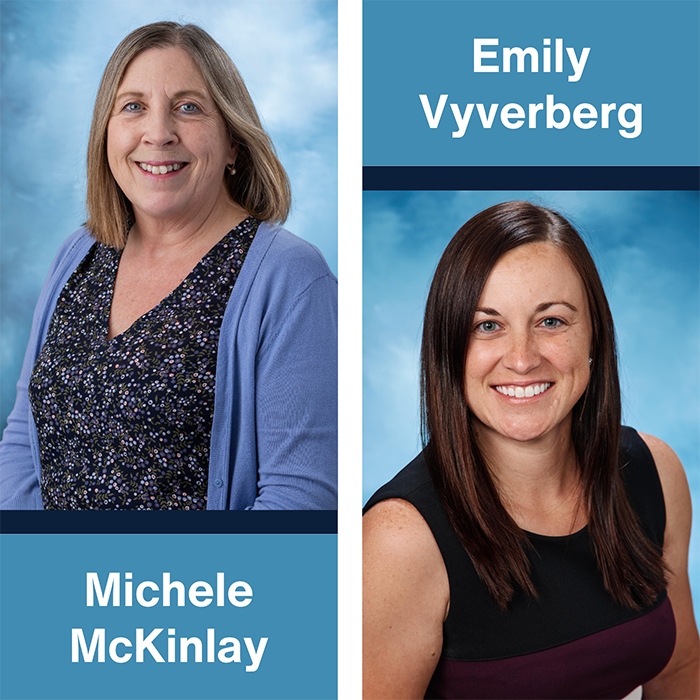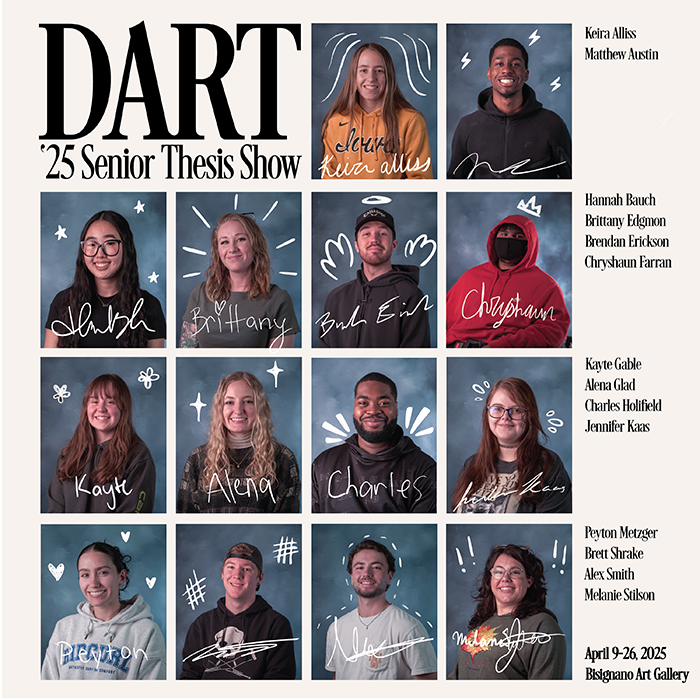2022 Chlapaty Fellows to Conduct Research
By Stacey Ortman
DUBUQUE, Iowa - Twelve University of Dubuque students were selected to participate in the Joseph and Linda Chlapaty Summer Research Fellowship. They will research a variety of topics this summer ranging from nature versus nurture of behavior health to the biodiversity and ecological assessment of fruiting fungi in Dubuque County.
In its 11th year, the competitive fellowship helps prepare talented undergraduate students across all disciplines for graduate or professional school.
"With the 11th cohort of fellows, the Joseph and Linda Chlapaty Summer Research Fellowship continues to provide students with the opportunity to engage in one-on-one research with University of Dubuque faculty members and to enhance their professional competence through post-graduate school examination preparation, communication skill-building, and professional networking so as to position themselves for success in their post-graduate studies and careers," said Mark Sinton, PhD, director of the Joseph and Linda Chlapaty Summer Research Fellowship.
Fellows will commit 400 hours of work on their research over a 10-week period during the summer. They will each receive a stipend of $4,500 and an additional $500 for research-associated supplies or travel costs. Fellows are required to present the results of their research or internship during the following academic year at a local, regional, or national conference.
"The Joseph and Linda Chlapaty Summer Research Fellowship has allowed numerous talented undergraduate students at the University of Dubuque to conduct scholarly research with faculty members, to prepare for graduate entrance exams, and to build a network of professional contacts. We are grateful to Joe and Linda Chlapaty for their investment in these students," said Rev. Jeffrey F. Bullock, PhD, president of the University of Dubuque
The following students were named 2022 Chlapaty Fellows:
Alexis Adkins, a junior biology major from Fennimore, Wisconsin
Project: Analyzing Health Effects of Lead in Tap Water on Caenorhabditis elegans
Advisors: Adam Hoffman, PhD, professor of environmental chemistry, and Mark Sinton, PhD, associate professor of chemistry
"I am excited and honored to be named a Chlapaty Fellow. This opportunity will help me continue my path to graduate school by helping me gain more experience and strengthening my skills in a lab setting.
"I hope that with conducting this research we are able to find how lead exposure in water affects the health and reproductive systems of C. elegans and see if the lead concentrations found in the water are environmentally relevant."
Jenna Bidlingmaier, a junior biology major from Winslow, Illinois
Project: Effects of Octyl Methoxycinnamate on C. elegans
Advisors: Kelly Grussendorf, PhD, associate professor of biology, and Adam Hoffman, PhD, professor of environmental chemistry
"Being a Chlapaty Fellow is an honor. I can't be more grateful for the opportunity given to me to pursue my interests, further my education, and hopefully set me up for success in my future endeavors of medical school.
"Through my research, I hope to gain more knowledge within the laboratory setting as well as learn new techniques. I also hope to connect with peers with the same drive and mentality as myself. Although I hope my project will find ground-breaking results, those results wouldn't be in the best interest of human health. Therefore, I, in a way, hope the results of my research are not what I expect them to be. In the long run, I simply hope my project will set me up for success in the future. Working alongside some of the best mentors and advisors this school has is a great start."
Bella Como, a senior biology and psychology double major from Carol Stream, Illinois
Project: Nature vs. Nurture of Behavior Health
Advisor: Kelly Grussendorf, PhD, associate professor of biology
"It is an honor to be named a Chlapaty Fellow. I am really excited to be a part of such a great opportunity. I will be able to research something of my own interest and this will help me decide my next steps regarding my future. This fellowship is an important step for my future and what I hope to pursue. I am grateful to be a fellow and for this opportunity.
"Through this project we will be able to gain further knowledge on the genetic contributions to mental illnesses. By receiving the baseline questionnaire answers from our participants, we will be able to gain insight on some of their common behaviors they may present in their everyday lifestyle. By then collecting a sample and testing their DNA for the MAOA gene, we will be able to compare the levels of MAOA activity in our population to the proposed behavior and see if there is a link between the gene and the behaviors present in our population. This project will aid me in becoming a better student because I will be able to conduct my own research and data gathering and then analyze it myself. These tools are very important for my current future path because these are crucial in both of my interests of biology and psychology. A huge part of both psychology and biology is the why factor. Through this project I will start addressing the why and how factor of biological influences on human behavior and psychological processes. That part of psychology is what really draws my interest: people's personality and why they are the way they are. I may be able to start finding answers to that interest through molecular work. My future goals are to attend graduate school and be in a profession where I can utilize both my biology and psychology knowledge to help better understand humans. I wish to continue to conduct research, so this project would be my first taste in that realm and will truly help me decide if this is something I still wish to pursue."
Emily Gross, a junior biology major from Eau Claire, Wisconsin
Project: Evaluating the Efficacy of Freezing-induced Genes of Putty-root Orchid in a Heterologous System
Advisor: Rasika Mudalige-Jayawickrama, PhD, professor of plant biology
"To be a Chlapaty Fellow is a privilege. I was excited to be selected for the opportunity to grow as a student academically and professionally.
"I hope this project will accomplish our goal of our freeze tolerant genes being shown in the selected model template system. Also, I hope to grow my skills and experience in the laboratory while creating new connections and knowledge within the opportunities the program gives us students."
Dylan Link, a senior environmental science major from Dyersville, Iowa
Project: Assessing the Importance of Macroinvertebrates as Bioindicators for Freshwater and Terrestrial Environments
Advisor: Adam Hoffman, PhD, professor of environmental chemistry
"It is an honor to be selected as one of the fellows. I think it speaks volumes of me and my work that my professors thought highly enough of me to select me as a fellow and believe in me and support me in this research.
"In this research I believe I can find and monitor aspects in our local waterways that will tell us how we can better manage and protect them, and I hope to get people to want to take action in doing both by giving them a better understanding of what wildlife is associated with our waterways and how unique and amazing they are."
Forrest Martin, a senior biology major from Byron, Illinois
Project: Prevalence & Distribution of Mudpuppies in Pool 12 of the Upper Mississippi River
Advisor: Adam Hoffman, PhD, professor of environmental chemistry
"I am honored to be named a Chlapaty Fellow and am grateful for such a life changing opportunity.
"I hope to achieve an in-depth understanding of the prevalence, distribution, and overall health of mudpuppy populations on Pool 12 of the Upper Mississippi River."
Sharon Moscoso, a junior biology major from Bremerton, Washington
Project: Using the Fast Track Gene Evaluation Method for the Functional Characterization of Freezing-induced Genes from a Native Orchid
Advisor: Rasika Mudalige-Jayawickrama, PhD, professor of plant biology
"I am honored to be named a Chlapaty Fellow. This will give me an opportunity to learn new skills and study something I am very interested in. I am thankful to my peers and advisors for helping me achieve this goal of mine.
"I hope that in conducting this research we are able to find that the cold tolerant gene is able to be expressed in our model system. I will be able to learn skills that will prepare me for graduate school as well as form meaningful connections along the way. This is a unique opportunity to grow who I am not only as a student but as a person as well."
Sara Nerad, a junior biology major from Janesville, Wisconsin
Project: Coinfection Rates of Two Tick-born Pathogens in Eastern Iowa
Advisor: Kelly Grussendorf, PhD, associate professor of biology
"Being named a Chlapaty Fellow meant the world to me. I can do research and learn more about biology, which will help me for after my undergrad preparations. This has also given me an opportunity to help expand not only my skills but my knowledge with vector borne diseases. This opportunity will also expand my relationship with all of my professors.
"I hope that my research will help expand the knowledge regarding vector borne disease and help those who have the disease. I also would like to help those in Dubuque know how not to get the disease and what the symptoms are regarding this disease (Babesiosis and Lyme disease). I would love not only to expand the public's knowledge but also mine with the lab techniques and how to collect samples."
Sean Wahlin, a senior biology major from Mineral Point, Wisconsin
Project: Dilution Effect of Lyme Disease in Southwestern Wisconsin
Advisor: Kelly Grussendorf, PhD, associate professor of biology
"To me, being a Chlapaty Fellow means a lot. This will give me the opportunity to make strides in the scientific field, while also giving me the experience I need for success in a future career in the medical field.
"I hope my project shows the effect that predators have in an ecosystem that is prevalent with parasitic bacteria. This could benefit many environmental scientists by being able to understand bacteria prevalence in an area based off the predator population and reservoir host population."
Emerson Wilson, a junior biology major from Grand Junction, Colorado
Project: Analysis of Macro and Microplastics Present in Sri Lankan Elephant Feces
Advisor: Lalith Jayawickrama, MS, assistant professor of natural and applied sciences
"I am so grateful to have been given this opportunity and I am proud to continue the legacy of Chlapaty Fellows. The laboratory skills I will learn and connections I will make are invaluable and very difficult to come by without programs like the Chlapaty Fellowship.
"For my research I am hoping to create a baseline of the typical total of macro- and microplastics found in wild Sri Lankan elephant feces."
Maryn Winders, a senior biology major from Dubuque, Iowa
Project: BPS Concentration Effects on C. elegans
Advisors: Kelly Grussendorf, PhD, associate professor of biology, and Adam Hoffman, PhD, professor of environmental chemistry
"I am beyond grateful to be named a 2022 Chlapaty fellow! I have been very interested in doing research since my first year on campus when I talked with many professors and past Chlapaty fellows about their projects. Every single one seemed so interesting and impactful in their own way, and I knew that I wanted to be a part of that by having my own project someday.
"I hope that my project can determine whether Bisphenol S (BPS) has harmful effects on C. elegans, and at what concentration of BPS the effects are observed. We will also determine if that same concentration is present in Dubuque County's waterways."
Natalie Winger, a junior environmental science major from Asbury, Iowa
Project: Biodiversity and Ecological Assessment of Fruiting Fungi in Dubuque County, Iowa
Advisor: Michele Zuercher, MS, assistant professor of biology
"Being named a Chlapaty Fellow has meant so much to me this year. I am honored and grateful that I have the opportunity to conduct research on something that I am so passionate about. I look to grow my lab and field research skills, as well as connect with fellow mycophiles.
"With my project, I hope to create a baseline biodiversity analysis of what fruiting fungi species are at the University of Dubuque's Wolter Woods and Prairies. It is so important to adequately characterize the fruiting fungi at the property to better understand the overall biological diversity of the region as well. With this, I hope to connect with any ongoing or future research on macrofungi in graduate school as well."



